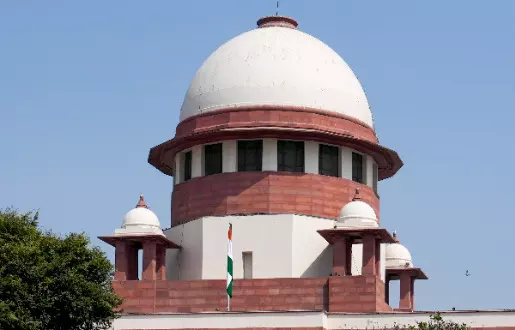SC by 2:1 majority recalls its verdict on post-facto green approvals

New Delhi: In a major ruling that reverses a significant precedent in environmental law, the Supreme Court, in a 2:1 majority decision on Tuesday, recalled its May 16 judgment that had barred the grant of retrospective environmental clearances. The decision effectively paves the way for the Central government and other statutory authorities to approve projects that have already begun construction in violation of environmental norms, provided the developers pay heavy penalties.
The majority verdicts, issued by Chief Justice of India B R Gavai and Justice K Vinod Chandran in two separate and concurring judgments, immediately revive the controversial 2017 notification and a subsequent 2021 Office Memorandum. These guidelines had previously established a regulatory pathway for projects to regularise operations despite having started construction without mandatory prior Environmental Clearances (ECs).
The central concern for the majority was the devastating financial and societal cost of upholding the May 16 verdict. Chief Justice Gavai and Justice Chandran stated that numerous vital public projects would be stalled or demolished, potentially leading to thousands of crores of rupees going to waste.
“If the JUR [judgement under review] is not recalled, it will result in demolition of various buildings/projects constructed out of the public exchequer to the tune of nearly Rs. 20,000 crore,” the Chief Justice of India noted, adding that he could cite at least three such examples.
Among the specific projects that were immediately affected by the original May 16 judgment, and now stand to benefit from the recall are an All India Institute of Medical Sciences (AIIMS) facility in Odisha, a greenfield airport planned for Vijayanagar in Karnataka, and several common effluent treatment plants crucial for pollution control infrastructure across the nation.
The Chief Justice directed the Supreme Court registry to place the matter before the administrative side of the court for necessary orders, ensuring a fresh hearing on the core pleas against the Centre’s notifications and office memorandum. Writing the 84-page judgment, the CJI formally ordered, “The judgment and order dated May 16, 2025 (Judgement under review) is recalled. The writ petitions and the appeal are restored to file.”
The majority decision was grounded in two primary contentions: a grave error in judicial discipline and the catastrophic potential impact on public interest. The Chief Justice’s verdict held that the original judgment was passed without considering key legal precedents and would lead to “devastating effects”, including the demolition of vital public works.
Addressing the precedent issue, the court determined that the judgment under review was rendered per incuriam, as it failed to consider at least three binding precedents from benches of the same strength in other cases. “It is trite law that a bench of two judges is bound by an earlier view taken by the other two-judge benches,” the CJI stated.
Referencing these binding decisions, the court clarified that while ex-post facto EC should not ordinarily be granted, precedent shows that “in exceptional circumstances they can be granted.” The court observed that past rulings established a balanced approach: “Where the adverse consequences of denial of ex-post facto approval outweigh the consequences of regularisation of operations by grant of ex-post facto approval, and the establishment concerned otherwise conforms to the requisite pollution norms, ex-post facto approval should be granted.”
Justice Chandran, in his concurring opinion, agreed that the failure of the previous bench to even notice these crucial judgments was a valid ground for review, finding it “imperative and expedient” to allow the petition. He referenced the top court’s past adherence to a balanced approach, holding industries accountable for operating without ECs but without ordering the closure of operations. The EC, he noted, cannot be declined with “pedantic rigidity, oblivious of the consequences of stopping the operation of a running steel plant.”
Chief Justice Gavai questioned the benefit of a rigid stance that would lead to mass demolition and reconstruction. “I, therefore, ask a question to myself as to whether it would be in the public interest to demolish all such projects and permit the money spent from the pocket of the public exchequer to go in the dustbin?” he asked. He further warned that a rigid approach of “demolition and reconstruction” would be “counter-productive to the public interest” by incurring massive waste and generating more pollution from the demolition and rebuilding process itself.
However, Justice Ujjal Bhuyan, who had been part of the initial May 16 verdict, delivered a strong dissent. He maintained that the post-facto grant of ECs is unknown and “anathema” to environmental law. According to Justice Bhuyan, such retrospective clearances are contrary to both the precautionary principle and the necessity of sustainable development.
In total, the court noted that 24 central government projects involving an expenditure of Rs 8,293 crore are currently pending, alongside 29 state-level projects worth Rs 11,168 crore. The recall of the judgment now offers a regulatory lifeline for this nearly Rs 20,000 crore worth of infrastructure that includes hospitals, medical colleges, and crucial pollution control systems.



